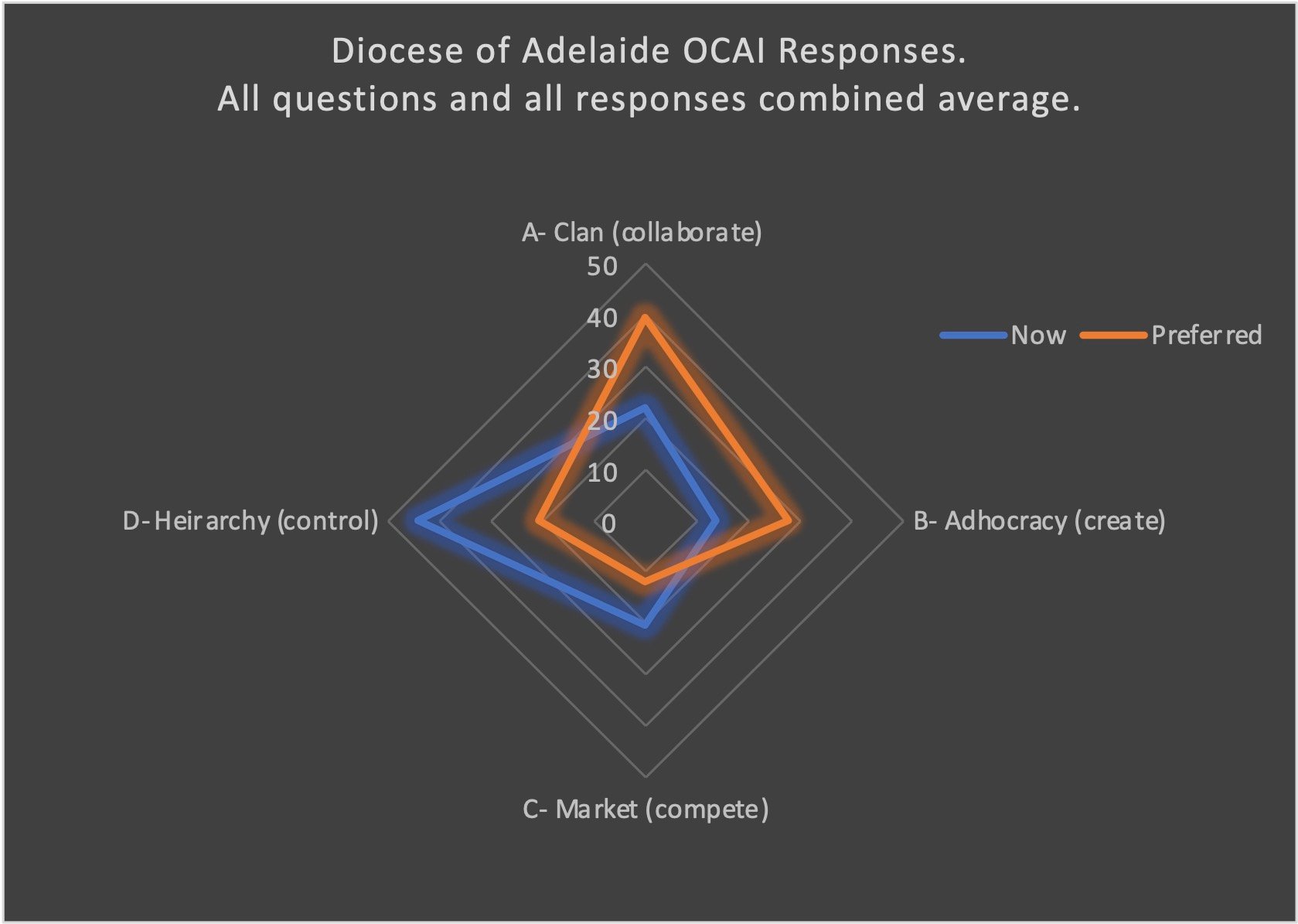How do we get to our preferred culture, with the aim of flourishing?
In the third and final part of her series discussing her research into the Adelaide Diocese’s cultural health, the Ven. Sophie Relf-Christopher shares some surprisingly encouraging findings about the potential for our parishes to flourish.
You can read the first part, proposing a rethink of the use of our Diocesan assets here and the second part about how participants of a new study view the current culture of the diocese here.
As we have seen overall the participants in my study rated our current dominant culture to be a hierarchy (with a clear focus on control, stability etc.) , at 44.33%. Conversely, the lowest percentage attributed was in the adhocracy culture quadrant (innovation, creativity etc.) rated at only 13.68%.
When asked what culture they would prefer, respondents turned those figures on their head as these illustrations shows at a glance.

On average the participants wanted to see:
- Clan culture near double from the current 21.78% to a preferred 39.41%.
- Adhocracy culture more than double from the current 13.68 % to a preferred 27.84%.
- Market culture near halved from the current 20.21% to a low preferred 11.96%, and
- Hierarchy more than halved from the current 44.33% to a preferred 20.79%.
The preference for a clan and adhocracy culture was universal – women, men, laity, clergy, over 60s and under 60.
It is easy to see why.
Strong clan (our most preferred) culture has a doubly constructive effect of boosting adhocracy organisational traits of innovation and creativity (our second preferred culture).
In other words, strong clan culture would lay the foundations for fruitful endeavours and releasing the energy required for dynamism, creativity, innovation, risk-taking, a de-centralisation of power, and entrepreneurism., all characteristic of an adhocracy.
The agreement we see across all cohorts is encouraging since it will take the united vision and effort of our diocese if we are to achieve our preferred culture.
It is also heartening to see that respondents have tempered their desire for significant increase in clan and adhocracy culture traits, with an acknowledgement that some hierarchy, and some market culture aspects will be necessary for the diocese in a future cultural landscape. It is not a case of one culture being all good or all bad. Each have their place in the mix. Hierarchy and market cultures provide governance, accountability, and operational essentials that cannot be overlooked in the functioning of an organisation such as our diocese, especially with the significant and growing compliance burdens we now, rightly, must have.
The survey also supports the new Diocesan Vision 2023-2025, developed with a significant number of parishes, and lay people within the diocese.
Many points from the Vision align with the findings of my leadership survey.
These are hopeful signs, since a near singularity of vision enables us to identify and develop the cultural mechanisms by which the energy and capacity of the diocese may be liberated toward meeting its stated aim of flourishing.
Ways forward – some thoughts
Projects that increase the clan and adhocracy elements of our culture will be of great use and may come from a wide range of voices. The following ideas are just the start.
The “culture grid” following may help us to sharpen some ideas to share between us.
| Clan cultureWhat should we do MORE of?What should we START?What should we STOP? | Adhocracy cultureWhat should we do MORE of?What should we START?What should we STOP? |
| Market cultureWhat should we do MORE of?What should we START?What should we STOP? | Hierarchy cultureWhat should we do MORE of?What should we START?· What should we STOP? |
Trust us! We’re the Church
Culture and trust are interdependent within any organisation.
When leaders create conditions for healthy change, they are best enabled by high levels of trust and significant buy-in, underpinned by a sense of “psychological safety”, even among less powerful members of the organisation.
A climate that is perceived as both safe and trustworthy encourages people to speak up if the change begins to deviate off course. For us to be truly clan, and adhocracy-focussed, we are going to need to be extremely attentive to nurturing each other’s trust and ensuring “psychologically safety”.
Explore new ministry models
Many parishes are unsustainably small. We know this. The current advice to our parishes is to have parish-to-parish discussions about potential resource sharing, parish-mergers, and other band-aid solutions. The problem with this approach is that the parishes that can survive without sharing resources are not motivated to do so, and those who are so depleted that resource merger may be a lifeline are often not equipped to initiate such a move.
Many parishes are also not equipped with the capacity to conceive of, nor initiate, the design by which a cooperation might function.
Nevertheless, it is important to consider new ministry models, and one option we might discuss is analogous to suburban medical practices. Medical centres these days provide the services that historically might have been offered by a sole practitioner GP – a dying breed thanks to compliance costs and rising community expectations regarding facilities and the range of services offered.
The idea of a single hub offering a range of allied medicine (or ministry in the case of the Church) may be helpful to re-conceive the suburban parish and its role in the local community.
At the very least, new alternative models for ministry need to be properly investigated and pilot projects undertaken.
Take risks and be prepared to fail
Undertaking entrepreneurial ventures necessarily involves risk. If the diocese is going to move from accepting a freefall decline in to active supporting of turnaround start-up projects, we must accept not all will be successful. In fact, most will not succeed. Until we experiment, we will not know what ideas might bear fruit. Pioneering should not be held up with excessive hierarchy, or a timid and risk-adverse posture, and ought to be fast tracked and supported.
Diversify our leadership and outlook
All organisations tend to recruit people who fit the existing culture of the organisation. Thus, in our diocese, clergy and laity encourage those who remind us of exisiting clergy to become ordination candidates and encourage people to take on leadership in parishes who fit a mould we have seen before. We will need to accept clergy, laity, and staff, who are different if we want different cultural outcomes and a more diverse clan culture. Addressing these issues is befitting the church of God (Galatians 3.26-28).
We can do this
Despite its challenging mission environment and sub-cultural divisions, real possibilities exist for our community to flourish in mission.
We just need intentional and sustained strategic action toward a future in which we increase clan culture so that we feel like a truly connected family of believers; and where we are empowered to take risks, and to be creative.
It is within our capacity to be attentive to the movement of the Holy Spirit, to reshape the culture of our diocese for 2023 and beyond, free from fear.
It is within our capacity to be attentive to the movement of the Holy Spirit, to reshape the culture of our diocese, free from life-draining fear.






